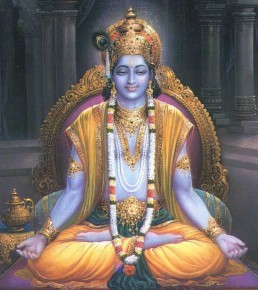Swami Chinmayananda
Swami Chinmayananda Commentary
In this stanza we have the description of the dull type of “fortitude,” and it is not very difficult to understand it because a substantial majority of us belong to this type! The steadiness-of-purpose with which one DOES NOT give up one’s dreams and imaginations, fears and agitations, griefs and sorrows, depressions and arrogance, is the Dhriti of the Tamasic type.
The term dream (Swapna) is used here to indicate fancied imaginations thrown up by a mind that is ALMOST drowned in sleep. To see things which are not there but are delusorily projected by one’s own fancy, is called a dream. The dull personalities project upon the world of objects a dream-like value of reality and false joy, and then laboriously strive to gain them.
FEAR (Bhaya) — Such men of delusion will have many a fancied fear of the future, which, of course, may never come to pass, but it can efficiently destroy the equilibrium and balance, poise and peace in the individual’s life. There are many among us who have experienced such fears by the hundred in the past. Some fear that they are going to die, but each following day a healthy man wakes up to face the world! Psychologically, they are victims of a fear-complex. And it is interesting to note with what great tenacity these men hug on to such complexes.
GRIEF, DEPRESSION AND ARROGANCE (Shokam, Vishaadam, Madam) — These again are great channels through which human vitality gets dissipated. A man of extreme ‘dullness’ will constantly keep these three within his bosom and thereby suffer a sense of self-depletion and inner exhaustion. “Grief” (Shokam) is, in general, the painful feeling of disappointment at something that has already happened in the PAST; while “depression” (Vishaadam) generally reaches our bosom as a result of our despair regarding the FUTURE; and “arrogance” (Madam) is the sense of lusty conceit with which a foolish man lives his immoral, low life in the PRESENT.
He who follows these five values of life is called by Krishna a fool (Durmedhaa), and the constancy with which such a fool follows his life of dreams and fears, griefs and despondencies, arrogance and passion, is indicated as the Dhriti of the Tamasic type.
“PLEASURE” ALSO IS THREE-FOLD ACCORDING TO THE PREDOMINANT “GUNA” IN THE INDIVIDUAL;
HERE FOLLOWS THE THREE-FOLD DIVISION OF “PLEASURE,” WHICH IS THE EFFECT OF “ACTION”:
Adi Sankara Commentary
That firmness is mata, considered to be; tamasi, born of tamas; yaya, due to which; durmedha, a person with a corrupt intellect; na vimuncati, does not give up-indeed, holds fast to; svapnam, sleep; bhayam, fear; sokam, sorrow; visadam, despondency; eva ca, as also; madam, sensuality, enjoyment of objects-mentally holding these as things that must always be resorted to, considering them to be greatly important to himself, like a drunkard thinking of wine. The threefold division of action as also of agents according to the differences of the gunas has been stated. After that, now is being stated the threefold division of results and happiness:
The Bhagavad Gita with the commentary of Sri Sankaracharya – Translated by Alladi Mahadeva Sastry
Holy Geeta – Commentary by Swami Chinmayananda
The Bhagavad Gita by Eknath Easwaran – Best selling translation of the Bhagavad Gita
The Bhagavad Gita – Translation and Commentary by Swami Sivananda
Bhagavad Gita – Translation and Commentary by Bhaktivedanta Swami Prabupadha
Srimad Bhagavad Gita Chapter 18 – Verse 35 – 18.35 yaya svapnam – All Bhagavad Gita (Geeta) Verses in Sanskrit, English, Transliteration, Word Meaning, Translation, Audio, Shankara Bhashya, Adi Sankaracharya Commentary and Links to Videos by Swami Chinmayananda and others – 18-35

